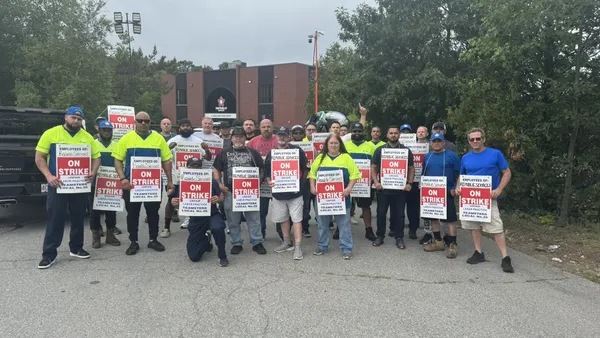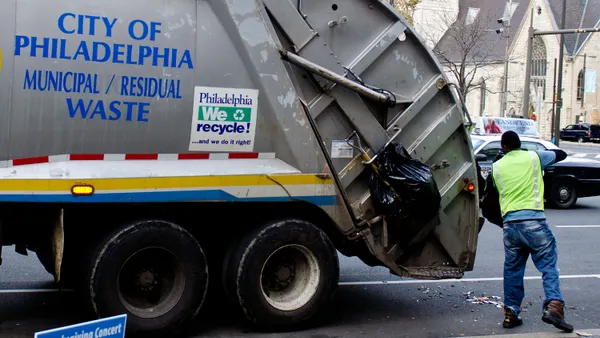Note: This story has been updated to include a comment from Republic Services.
Rubicon Global and Waste Connections appear to be headed for court once again in the wake of a new lawsuit and request for an injunction over the technology company's methods of acquiring customers.
The complaint, filed in Harris County, TX on Aug. 7, alleges multiple legal issues with the way Rubicon competes for Waste Connections' customers, and also raises safety concerns about how Rubicon often arranges to have containers towed when those efforts are successful. This is at least the fifth case filed against the Atlanta-based company by Waste Connections or its subsidiary Progressive Waste Solutions in the past year, including a similar example in Louisiana that both sides have claimed as a victory. In response to this wave of legal action, Rubicon continues to remain defiant and portrays the attention as a sign that its goals of disruption are having an effect on the industry's largest companies.
According to the Waste Connections complaint, the main issue in this case is Rubicon's "repeated and widespread practice" of hiring local towing companies to haul away containers when taking over an account. The complaint cites at least 35 examples of this occurring in the Houston area since last October. While Rubicon's method of taking over customers is also described as problematic — in part because Waste Connections says its service agreements include the right to match any offers — the container handling is the primary focus.
Waste Connections says it is sometimes only given a few days notice that customers are switching to Rubicon and their containers need to be picked up. If the containers aren't picked up, Rubicon will hire local tow truck companies — whose safety practices are questioned — to remove these containers from the property. As described in the complaint, these containers may be dropped off at the nearest Waste Connections yard (sometimes still full) or go missing for multiple days.
The complaint seeks temporary and permanent injunctive relief against Rubicon having any further containers towed in Texas. In addition, the complaint alleges tortious interference, negligence, conversion and violation of Texas law regarding waste transport. Multiple pages are also devoted to highlighting Waste Connections' safety culture and record as a basis for what's at stake.
“…Every time a Rubicon-hired tow truck rumbles down a highway in Texas with a multi-ton waste container chained precariously on the back of the truck — often filled with garbage that could blow out of the container — Waste Connections’ image and reputation as a safety-conscious waste disposal company is undermined and irreparably harmed in ways that cannot be calculated or compensated," reads the complaint, which later states, "...when, not if, an accident occurs involving a Rubicon-hired tow truck’s unauthorized movement of containers, Waste Connections' goodwill and reputation will be immeasurably damaged."
When asked for a reply to the characterization of its contract competition and third-party towing practices, a Rubicon spokesperson offered the following response via email.
"This is the latest move in a pattern of anti-competitive behavior by one of the Big 3, with the sole focus of squashing independent haulers' ability to deliver better prices and more transparency to America's Main Street businesses. These strong-arm tactics used by companies like Waste Connections to thwart free enterprise and competition are finally starting to be exposed."
Republic Services, via an emailed statement, confirmed similar encounters with Rubicon.
"Republic Services has also experienced this and have sent letters to Rubicon to cease this activity as well as to some third-party towing companies. We will continue to use all legal means available to protect our assets," wrote Russ Knocke, vice president of communications and public affairs for the company.
Waste Management declined to comment on whether any of their containers had been towed by Rubicon in a similar manner, and if so whether they had pursued legal action as a result.
So far, Waste Connections appears to have been the most active litigant against Rubicon for this and similar issues. In addition to a June lawsuit against Rubicon and a former employee over alleged theft of trade secrets — which is still ongoing — there have also been four other complaints related to customer competition.
In August 2016, Waste Connections sued Rubicon for tortious interference in North Carolina. That same month, Progressive Waste Solutions also sued Rubicon for interference and container removal in Texas. In December 2016, Progressive sued Rubicon and two former customers on multiple points, including issues with container removal. Those cases are in various stages of progress, though a separate case in Louisiana went to trial in June and the results have since become a key example for both sides.
On June 14, a state district court in Louisiana granted an injunction against Rubicon towing any Waste Connections containers for at least 14 days after they received all outstanding payments. This applies statewide, though Waste Connections had initially sought a national injunction. The Louisiana decision is as seen as a direct correlation to what Waste Connections is seeking in Texas, though according to Rubicon this wasn't a bad outcome for them.
"Waste Connections sought the same relief in Louisiana that they are seeking here, i.e., a blanket order enjoining Rubicon from ever removing a Waste Connections container from a customer’s property. The court in Louisiana did not grant them that relief, instead only ruling that Rubicon could not remove Waste Connections’ containers for fourteen business days, thus recognizing that there is a point at which Waste Connections must remove its containers. This was a critical first step in ensuring free market competition in the waste industry," wrote the company's spokesperson via email.
Waste Connections pushed back strongly on this interpretation and Rubicon's claims of anti-competitive behavior.
“Rubicon’s comments are typical doublespeak by a party trying to save face after a resounding defeat. Rubicon strenuously fought against the injunction in Louisiana and is appealing its loss. Rubicon’s investors should be alarmed at such mischaracterizations of fact. The judge in Louisiana found Rubicon’s conduct unsafe and strongly suggested Rubicon’s conduct was criminal. In his ruling, the judge warned Rubicon that if it ever towed containers in Louisiana they would be doing so ‘at their own peril.’ Waste Connections will seek to enjoin Rubicon wherever and whenever it engages in such unsafe and unlawful conduct, which is why Waste Connections filed the most recent lawsuit in Houston. The issue here is not competition. Rather, the issue is Rubicon’s unsafe and unlawful tactics of towing Waste Connections’ containers without authority," said Pat Shea, senior vice president, general counsel and secretary of Waste Connections, in a written statement.
It will now be up to a Harris County judge to decide whether Rubicon's conduct has crossed a line in these instances, and the potential results of the Louisiana appeal may provide further clarity.
Competition is of course a natural part of the industry and every company is always working to make claims of better service for better prices. The fact that containers can be delivered quickly for new service, but may take longer to disappear if that service is canceled, is seen by some as part of those competitive tactics. While safety should be a priority for any operator with a commercial driver's license, the use of flatbed trucks intended for cars is seen as a less common method for moving those containers.
In addition to seeking results on these contractual and logistical points, this latest complaint is also part of a larger effort to cast judgment in the court of public opinion. After extolling their own virtues in the complaint, Waste Connections went after Rubicon's reputation on many of the same points that have been publicly raised by the industry's other large companies in recent months. They cite Rubicon's lack of physical equipment, downplay their technology platform and describe them as no different than other brokers or companies with similar contract terms.
Rubicon has not been shy about criticizing the industry's top companies since it launched in 2008 and has garnered increasing amounts of attention from outside the industry as a result. The question now is whether these lawsuits are a sign that its business practices are starting to catch up to it, or that it's now being perceived as more of a threat.










